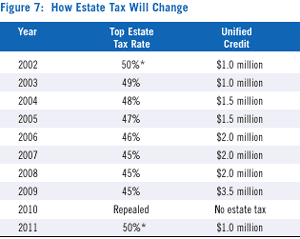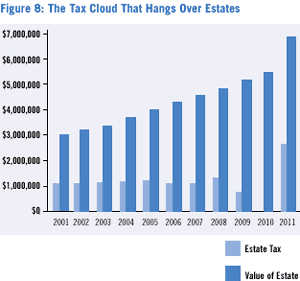| Estate Planning |
|
The estate tax will change over eight years, 2002 through 2009. In 2010, it will be totally repealed, but for only one year. In 2011, under the general "sunset" provision of this law, estate taxes are due to return unless additional legislation is passed. Even during 2010, when the estate tax is temporarily repealed, taxpayers will be exposed to tax complexity: |
|
- Because of the estate tax repeal, the unlimited marital deduction is also eliminated.
- The stepped-up basis that estates now enjoy will be replaced by new modified carryover basis rules. Stepped-up basis allows property to be transferred after death without paying capital gains tax that would have been due had the same property been sold before death. Upon repeal of the estate tax, the new modified carryover basis rules will result in a decedent's heirs receiving property at the lesser of a decedent's adjusted basis or the fair market value at date of death. To this value, the executor can allocate a limited stepped-up basis of $1.3 million of property, with an additional $3 million for property passed to a spouse. The decedent's adjusted basis is generally equal to what he paid for the asset adjusted for depreciation or improvements to the property. Consequently, under the new rules, the heirs may have to pay capital gains tax when they sell the asset. Also, the act identifies specific assets, such as retirement plans and IRAs, that the executor is not permitted to allocate a stepped-up basis.
- A tax will continue on lifetime gifts above a $1 million exemption. This exemption is effective in 2002, but unlike the estate tax exemption, does not increase in the future.
The major change from 2002 through 2009 will be an increase in the Unified Credit Exemption Equivalent (UCEE), also known as the applicable exclusion amount, from $1 million to $3.5 million per estate. This credit shelters assets passing at death to a non spouse from estate tax. Spouse beneficiaries enjoy an unlimited marital deduction during this period. Another change will be gradual 1% reductions in the top estate tax rate in each year from 2002 through 2007. Figure 7 contains details.

*A 5% surcharge also applies to estates over $10 million.
In some cases, the estate tax relief granted from 2002 to 2009 will only offset the growth in estate values. Figure 8 shows the potential tax impact that began in 2001 on a hypothetical estate worth $3 million. The estate is assumed to increase in value by 7% per year, and the amount in excess of the UCEE is assumed to be taxed as if death occurs in that year and the entire estate is left to a non-spouse.

Planning Ideas for the Estate Tax
Don't Drop Plans or Protection: Be careful about changing estate plans already made, or dropping insurance coverage designed to pay estate taxes. Count on estate planning complexity to continue for the next decade, especially if Congress takes no further action to prevent "sunset" in 2011. People who assume their estate will owe no tax, because of the increasing Unified Credit Exemption Equivalent, may leave heirs vulnerable to new estate tax rules Congress may create in the future. If insurance coverage is canceled, there is no guarantee that it can be replaced at the same rates in the future-or if it will even be issued if the insured's health has declined.
Take Modified Carryover Basis Seriously: For some estates, it is possible that the modified carryover basis rules upon estate tax repeal will prove more burdensome than the estate tax itself. One reason is the potential capital gains liability for heirs, which does not exist in the current system. Modified carryover basis requires an executor to keep records of the decedent's basis. This record keeping can be burdensome. If an executor cannot determine basis, it is possible that the IRS would consider the basis zero, therefore increasing the amount of taxes owed. Also, the carryover basis system does not allow a surviving spouse to receive an unlimited amount of property free of capital gains tax as the estate tax does. If you expect to leave or inherit a large estate, it's not too soon to begin evaluating these new rules with a financial professional.
Review Estate Plans Periodically: Before taking actions to modify an estate plan, it's wise to review all the changes in the law and to consider the sunset provision. In addition to federal estate taxes, make sure to consider state tax consequences, the impact of a revised gift tax, and the complexity created by modified stepped-up basis. The bottom line of estate tax repeal is that people can bet on it. But they can't count on it, and their heirs shouldn't have to pay for actions taken in haste.
The Bottom Line of Tax Relief
An Opportunity for Those Who Act on It
There's nothing small or simple about this historic tax act. It transfers more than a trillion dollars from federal coffers into the pockets of taxpayers-but very slowly and with many twists and turns. For each taxpayer, the ability to maximize the opportunities will depend on learning where the new incentives lie, adjusting plans prudently, and taking actions that keep planning in stride with the gradual changes and "sunsets." There's a tax bonus for most people buried in this law, but it may take more information and sound professional advice to identify opportunities and act on them. Now is the time to review planning with a financial professional and adjust personal strategies. Good luck during this decade of tax opportunity!